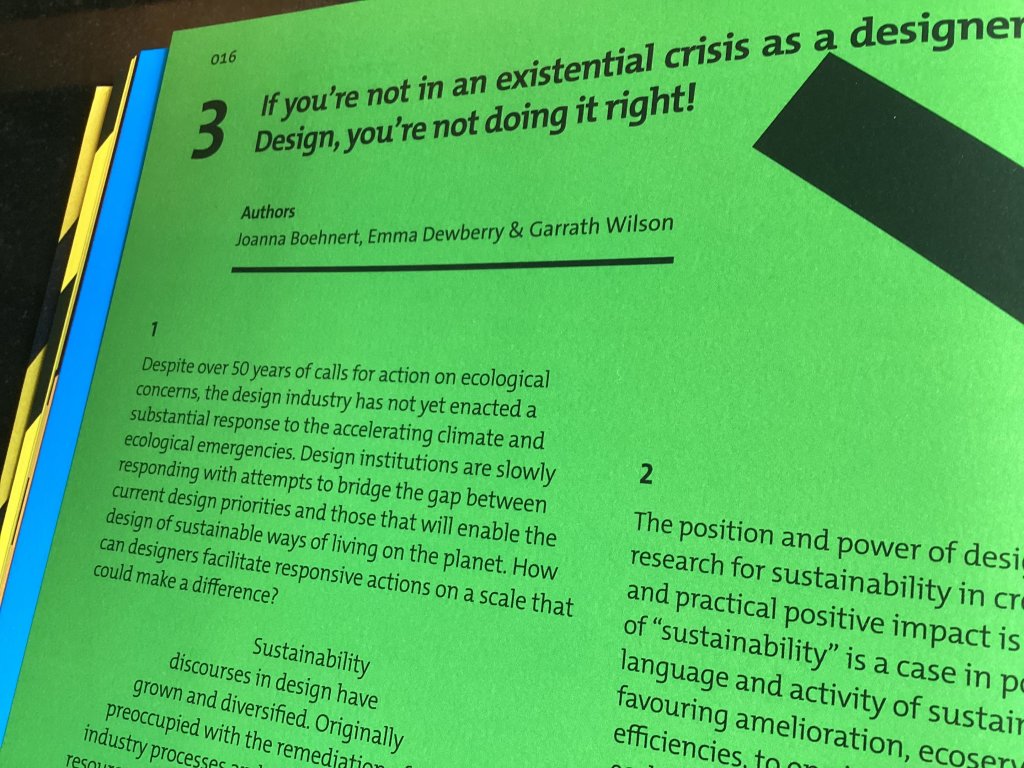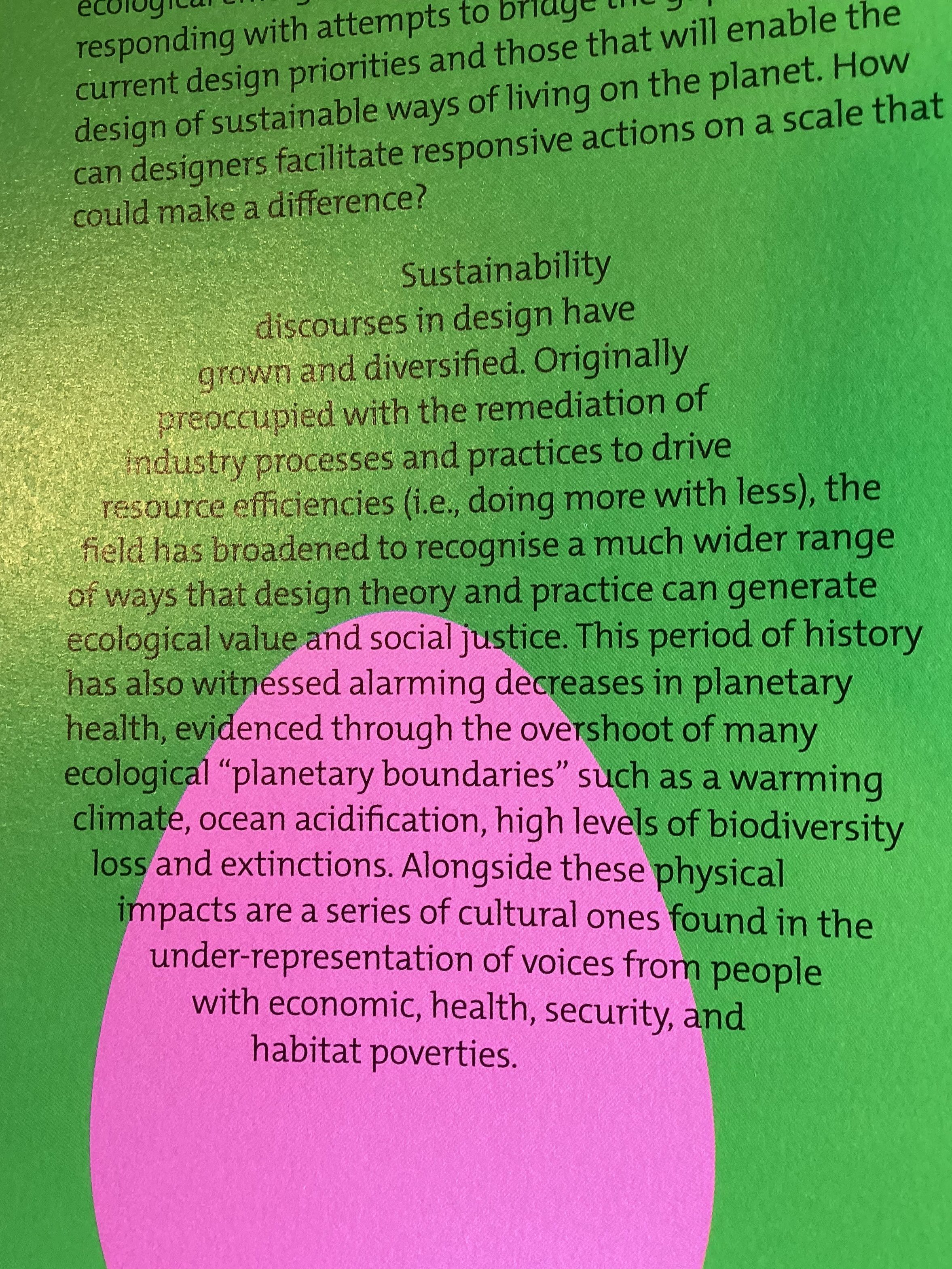Our Design Research Society Sustainability Special Interest Group text was just published in Brand Magazine. This is what we wrote.

1/
Despite over 50 years of calls for action on ecological concerns, the design industry has not yet enacted a substantial response to the accelerating climate and ecological emergencies. Design institutions are slowly responding with attempts to bridge the gap between current design priorities and those that will enable the design of sustainable ways of living on the planet. How can designers facilitate responsive actions on a scale that could make a difference?
Sustainability discourses in design have grown and diversified. Originally preoccupied with the remediation of industry processes and practices to drive resource efficiencies (i.e., doing more with less), the field has broadened to recognise a much wider range of ways that design theory and practice can generate ecological value and social justice. This period of history has also witnessed alarming decreases in planetary health, evidenced through the overshoot of many ecological ‘planetary boundaries’ such as a warming climate, ocean acidification, high levels of biodiversity loss and extinctions. Alongside these physical impacts are a series of cultural ones found in the under-representation of voices from people with economic, health, security, and habitat poverties.

2/
The position and power of design education and design research for sustainability in creating both strategic and practical positive impact is fractured. The definition of ‘sustainability’ is a case in point. Shifting the language and activity of sustainability from responses favouring amelioration, ecoservice logics and resource efficiencies, to one instead revealed through critical ecological and social value, proves challenging.
Misappropriation of the terms ‘sustainability’ and ‘sustainable’ further complicate ways in which new knowledge and understanding can be adequately authenticated against pervasive green-washing, techno-fix reliance and oversimplifications of complex transition imperatives. We now face a critical, ecological turn. The crux of this shift for design research is the need to redefine this discipline space in transitionary times to create the ecological imagination of, and ways for design, as this century progresses.
The distinction between rigorous approaches to sustainable transitions and greenwashing discourses is a battleground in many design institutions. Outdated priorities, ideas and structures need to be challenged. The ways of thinking and doing that led to our current crises are not fit for purpose. Yet ecologically engaged perspectives are still poorly understood by many.
Design activities are among those historically predicated on the linear resource throughput embedded in many products, services, and systems; all created to signify economic development and progress, where progress is valued for a privileged minority. How we create new ways of living – moving away from extractive and exploitative relationships between people and planet – is now a fundamental necessity.
Sustainability scholars describe ecologically engaged ontologies, epistemologies, and ethics. Here, the relational and ecological are emergent. We describe new structures of governance as rooted in the understanding that wellbeing and safety as a collective condition.

3/
The effects of climate warming and biodiversity loss uproot the traditional ‘design for industry’ proposition from its established knowledge and practice. This displacement enables an exploration of how the design of future sustainable ways of living could emerge from the transformation and reorganisation of human relationships within ecological systems.
Design, in its multiple disciplines, must be transformed by ecological literacies and capacities to think strategically about the development of generative entanglements. New ecologically engaged design knowledge and practices must sit alongside both mature and other emerging areas of design research such as behaviour change, pluriversal design, wellbeing, and global health.
Knowledge systems as well as design practices are in transition to create possibilities for radical social change. Ecological, systemic, and transdisciplinary knowledge are a foundation for this transformation. Ways of knowing that viewed the only function of ‘the environment’ as a resource to be utilised (exploited) are the legacy of an intellectual tradition that dismissed both the environment (the biosphere and other species) and the interests of particular groups of people. These assumptions have also been embedded into traditional conceptions of ‘good’ design – often design devoid of considerations for ecological and social justice boundaries. For this reason, standards, priorities, and practices must all engage in a process of transition to make viablefuture ways of living – what some design theorists now call sustainment.

4/
Central to the concept of designing for sustainment is the need to challenge and extend current design knowledge and practice. We can see these changes in other disciplines. In economics for example, we see the rise in interest in ideas which position transactional life in ecological terms and ensure ecological externalities are fully costed and the needs of all protected, in how ideas of wealth and wellbeing are defined and nurtured.
In times of emergency, we often seek to rebuild what is familiar and tested. The overshoot of ecological boundaries means that this is no longer a viable approach. The appropriation of the sustainability agenda by those who will not enact urgently needed transformative change is a danger in design research, education, and practice. The DRS SUSSIG is part of a process of connection and reconstruction that promotes the value of creative, academic rigour in developing transformative new narratives, material, and infrastructures for the sustainment of human and non-human co-existence on our beautiful planet.
Authored by Joanna Boehnert, Emme Dewberry and Garrath Wilson. A PDF is available here.
If you are not in an existential criss as a designer in Sustainable Design, you are not doing it right!
DRS Sustainability SIG contribution to Designers’ Existential Crises series, edited by Lesley-Ann Noel
Brand Magazine, August 2023